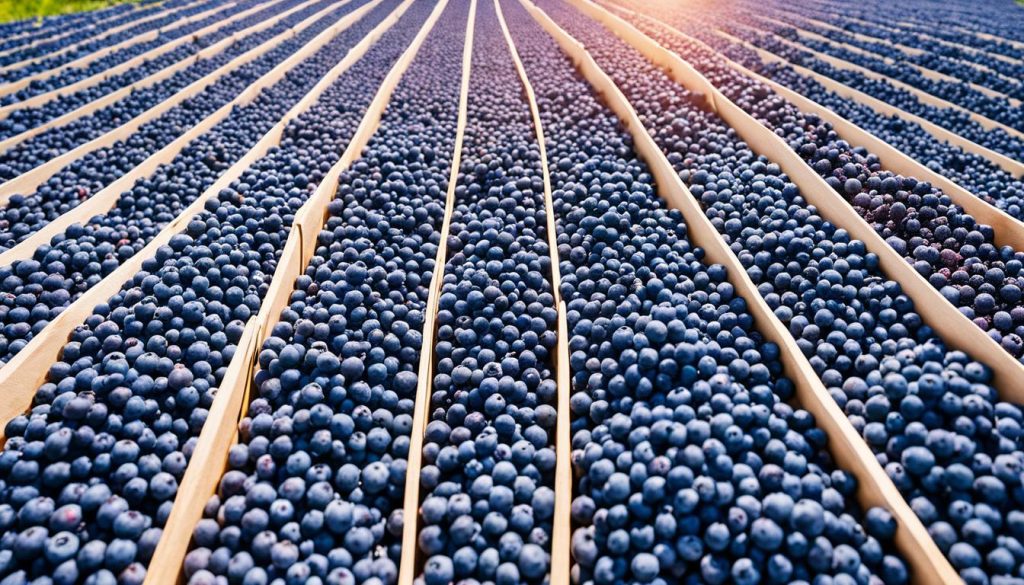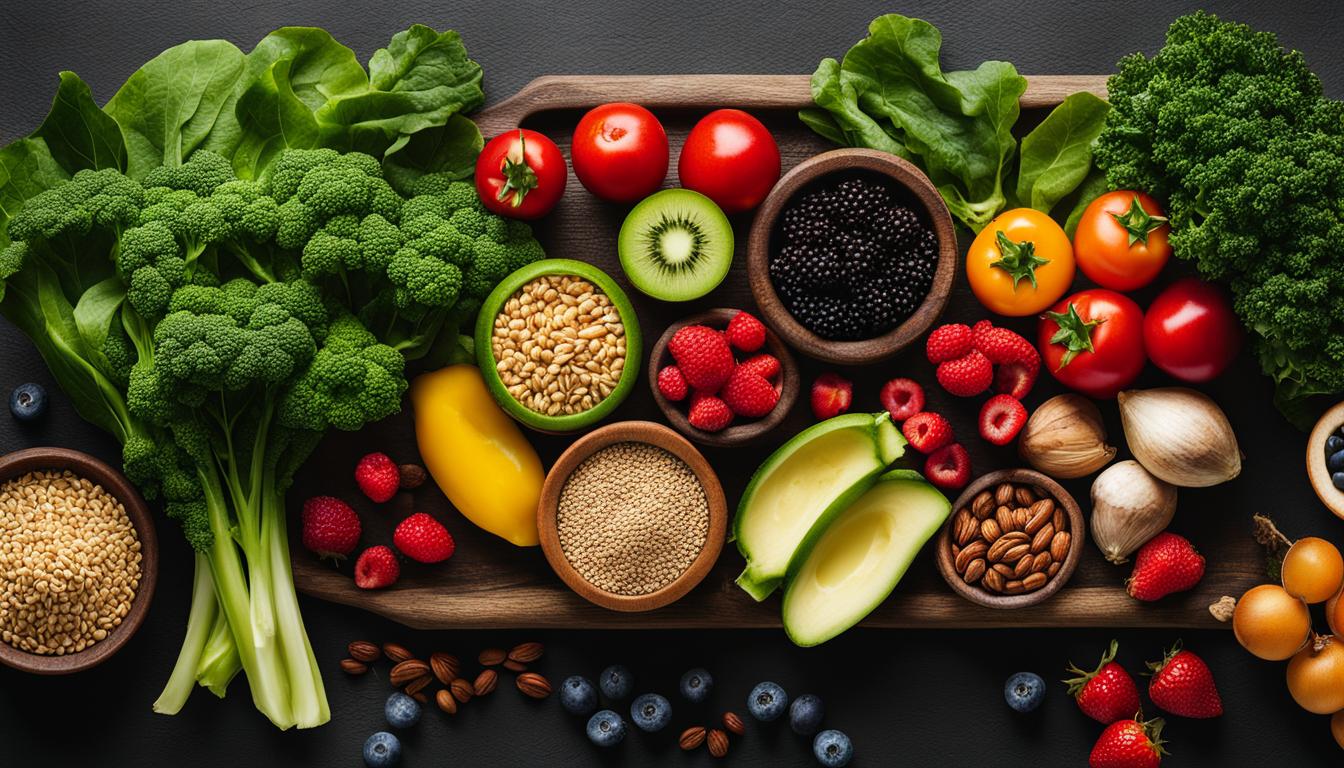Incorporating superfoods into your diet can have a significant impact on your overall well-being. These nutrient-dense foods offer a wide range of health benefits, from boosting immunity to supporting brain function. In this article, we will explore 15 superfoods that are packed with essential nutrients, vitamins, and minerals, all contributing to your overall wellness.
Key Takeaways:
- Superfoods are nutrient-dense foods that offer exceptional health benefits.
- Including a variety of superfoods in your diet can improve overall well-being and prevent various health issues.
- Blueberries, salmon, kale, quinoa, avocado, sweet potatoes, broccoli, chia seeds, turmeric, Greek yogurt, spinach, almonds, garlic, berries, and dark chocolate are some of the superfoods with impressive nutritional profiles and positive impacts on health.
- Superfoods like blueberries are rich in antioxidants, which can improve cognitive function and reduce the risk of age-related diseases.
- Salmon, a great source of omega-3 fatty acids, supports brain health, heart function, and reduces inflammation.
Blueberries: The Antioxidant Dynamo
Blueberries are a remarkable superfood, offering a powerhouse of health-boosting benefits. Their key feature lies in their high antioxidant content. Blueberries are packed with a group of antioxidants called flavonoids, which have been extensively studied for their ability to improve cognitive function and reduce the risk of age-related diseases.
The flavonoids present in blueberries are known to have a positive impact on cognitive function, enhancing memory, reasoning, and decision-making abilities. These antioxidants protect the brain from oxidative stress and promote healthy brain aging.
In addition to their cognitive benefits, blueberries offer a range of essential nutrients. They are rich in vitamins C and K, both of which play critical roles in maintaining overall health. Vitamin C strengthens the immune system, supports collagen synthesis, and acts as a potent antioxidant. Vitamin K, on the other hand, aids in blood clotting and bone health.
Blueberries are also an excellent source of dietary fiber, which contributes to digestive health and helps regulate blood sugar levels. Fiber promotes feelings of fullness, reducing overeating and aiding in weight management.
Incorporating blueberries into your diet is a simple and delicious way to improve your well-being. Whether enjoyed fresh, frozen, or in various recipes such as smoothies, oatmeal, or salads, these vibrant berries are a versatile addition to any meal plan.
Did you know?
Blueberries are among the fruits with the highest antioxidant capacity.
Their deep blue color is attributed to anthocyanins, a subclass of flavonoids that provide many of their health benefits.

| Nutrient | Amount per 1 cup (148g) |
|---|---|
| Fiber | 4 grams |
| Vitamin C | 24% of the Daily Value (DV) |
| Vitamin K | 36% of the DV |
| Antioxidants | High levels of anthocyanins |
Salmon: Omega-3 Fatty Acid Haven
Salmon is a powerhouse when it comes to omega-3 fatty acids, making it a fantastic addition to any diet. These essential fats play a crucial role in brain health, heart function, and reducing inflammation throughout the body. By regularly incorporating salmon into your meals, you can support cardiovascular health and enhance cognitive function.
Omega-3 fatty acids are particularly beneficial for brain health, as they contribute to the structure and function of brain cells. Research suggests that these fats can help improve memory and cognitive performance, making salmon an ideal food for sharpening your mental acuity. Additionally, omega-3 fatty acids have been linked to a reduced risk of age-related cognitive decline, such as Alzheimer’s disease.
But the benefits of salmon don’t stop at the brain. These omega-3 fatty acids also have a positive impact on heart health. Studies have shown that consuming salmon regularly can help lower blood pressure, reduce triglyceride levels, and decrease the risk of heart disease. The anti-inflammatory properties of omega-3s also play a vital role in cardiovascular health by reducing inflammation in blood vessels and preventing the formation of blood clots.
Inflammation is a common underlying factor in many chronic diseases, including cardiovascular issues. By adding salmon to your diet, you can help combat inflammation and promote overall wellbeing. The omega-3s in salmon have been shown to reduce the production of inflammatory molecules and support the body’s natural anti-inflammatory processes.
To fully grasp the nutritional value of salmon, take a look at the table below:
| Nutrient | Amount per 100g |
|---|---|
| Omega-3 Fatty Acids | 2.6 grams |
| Protein | 22 grams |
| Vitamin D | 526 IU |
| Vitamin B12 | 3.2 mcg |
| Vitamin B6 | 0.6 mg |
| Selenium | 43.3 mcg |
| Potassium | 383 mg |

Including salmon in your diet is a smart choice for promoting brain health, supporting heart function, and reducing inflammation in the body. Whether you enjoy grilled salmon fillets, salmon salads, or even salmon sushi, this versatile superfood provides an abundance of omega-3 fatty acids and other essential nutrients to keep you at the top of your game. So, savor the goodness of salmon and reap the numerous benefits it offers for your overall well-being.
Kale: Nutrient-Rich Leafy Green
Kale is a nutritional powerhouse that deserves a prominent place in your diet. Packed with vitamins A, C, and K, as well as calcium and iron, kale provides a wide range of essential nutrients to support your overall health.
One of the key benefits of kale is its high vitamin content. Vitamin A is essential for maintaining healthy vision, while vitamin C boosts your immune system and promotes collagen production for healthy skin. Vitamin K plays a crucial role in blood clotting and bone health.
Not only is kale rich in vitamins, but it also provides important minerals. Calcium is essential for strong bones and teeth, while iron is necessary for oxygen transport and energy production in the body.
One of the great things about kale is its versatility. You can enjoy kale in salads, sautéed as a side dish, or blended into nutrient-packed smoothies. Adding kale to salads adds a fresh, crisp texture and a slight bitterness that pairs well with other ingredients. When sautéed, kale becomes tender and flavorful, making it a delicious accompaniment to any meal. Alternatively, you can blend kale into smoothies for a quick and easy way to boost your nutrient intake.
Make sure to incorporate kale into your diet regularly to reap the nutritional benefits it offers. Whether you enjoy it in salads, sautéed dishes, or smoothies, kale is a fantastic addition to any meal.
Here’s a quick recipe idea to incorporate kale into your diet:
Kale and Quinoa Salad
Ingredients:
- 1 cup cooked quinoa
- 2 cups chopped kale
- 1/2 cup cherry tomatoes, halved
- 1/4 cup crumbled feta cheese
- 2 tablespoons extra virgin olive oil
- 1 tablespoon lemon juice
- Salt and pepper to taste
Instructions:
- In a large bowl, combine the cooked quinoa, chopped kale, cherry tomatoes, and crumbled feta cheese.
- In a small bowl, whisk together the extra virgin olive oil, lemon juice, salt, and pepper.
- Pour the dressing over the salad and toss to combine.
- Let the salad sit for 10 minutes to allow the flavors to meld together.
- Enjoy as a refreshing and nutritious salad!
| Nutrient | Amount per 100g |
|---|---|
| Vitamin A | 317% of the Daily Value (DV) |
| Vitamin C | 230% of the DV |
| Vitamin K | 1,020% of the DV |
| Calcium | 15% of the DV |
| Iron | 5% of the DV |

Quinoa: The Complete Protein
When it comes to superfoods, quinoa stands out as a nutritional powerhouse that offers a variety of health benefits. Not only is quinoa gluten-free and a whole grain, but it is also packed with protein, making it an excellent choice for vegetarians and vegans looking to meet their protein needs.
What sets quinoa apart from other grains is its high protein content. In fact, quinoa contains all nine essential amino acids, making it a complete protein source. This makes it an ideal food for individuals who are looking to increase their protein intake, such as athletes or those following a plant-based diet.
In addition to its protein content, quinoa is also rich in fiber. Fiber plays a crucial role in digestion and helps promote a feeling of fullness, making it a valuable addition to a balanced diet.
Not only is quinoa nutrient-dense, but it is also easy to incorporate into various dishes. It can be enjoyed as a base for salads or as a side dish, and its mild nutty flavor complements a wide range of flavors.
Quinoa Nutritional Profile
| Nutrients | Amount per 100g |
|---|---|
| Protein | 14g |
| Fiber | 7g |
| Iron | 2.8mg |
| Magnesium | 197mg |
| Phosphorus | 318mg |
| Calcium | 31mg |
Quinoa’s nutritional profile is impressive, as it is not only a good source of protein but also contains essential minerals such as iron, magnesium, phosphorus, and calcium.
So, whether you’re looking to increase your protein intake, follow a gluten-free diet, or simply add more whole grains to your meals, quinoa is a versatile and nutritious option that can benefit your overall health and well-being.
Avocado: Creamy Goodness with Healthy Fats
When it comes to superfoods, avocados take center stage with their creamy texture and rich taste. But that’s not all they have to offer. Avocados are loaded with heart-healthy monounsaturated fats, making them an excellent choice for those looking to improve their cardiovascular health.
The consumption of monounsaturated fats has been linked to improved cholesterol levels and a reduced risk of heart disease. These healthy fats help raise levels of good cholesterol (HDL) while lowering levels of bad cholesterol (LDL), which can contribute to heart disease and other cardiovascular issues.
In addition to their monounsaturated fats, avocados are a nutrient powerhouse. They are packed with a variety of vitamins, minerals, and antioxidants that support overall health and well-being.
Powerful Nutrients in Avocados
Avocados are rich in vitamins such as vitamin K, vitamin E, and a range of B vitamins, including folate. These vitamins play essential roles in various bodily functions, including the maintenance of healthy blood cells, immune function, and energy production.
Minerals such as potassium and magnesium are also found in abundance in avocados. Potassium is crucial for maintaining proper heart function and controlling blood pressure, while magnesium plays a role in bone health, nerve function, and muscle relaxation.
Moreover, avocados are a great source of antioxidants, which help protect your cells from damage caused by harmful free radicals. The antioxidants in avocados, such as lutein and zeaxanthin, are particularly beneficial for eye health, reducing the risk of age-related macular degeneration and cataracts.
Incorporating Avocados into Your Diet
Avocados are incredibly versatile and can be enjoyed in various ways. They can be sliced and added to salads or sandwiches, mashed into a creamy guacamole, or blended into smoothies for an extra dose of nutrition. Their creamy texture also makes them a popular ingredient in plant-based desserts, like avocado chocolate mousse.
To fully reap the benefits of avocados, it is recommended to consume them in moderation due to their high caloric content. A serving size of avocado is typically about one-third of a medium-sized fruit, which provides around 80-100 calories.
So, next time you’re at the grocery store, don’t forget to add some avocados to your shopping list. Not only will you enjoy their delicious taste and creamy texture, but you’ll also be nourishing your body with heart-healthy fats, vitamins, minerals, and antioxidants.
Sweet Potatoes: A Nutrient-Rich Carb Source
Sweet potatoes are a delicious and nutritious alternative to regular potatoes. They are not only packed with flavor but also offer a wealth of health benefits. These vibrant root vegetables are a rich source of vitamins A and C, which are essential for maintaining good eyesight and a strong immune system.
In addition to vitamins, sweet potatoes are high in fiber, promoting healthy digestion and aiding in weight management. The fiber in sweet potatoes can help you feel fuller for longer, preventing overeating and supporting a healthy weight. Furthermore, sweet potatoes are loaded with antioxidants, which help protect your body against oxidative stress and reduce the risk of chronic diseases.
One of the key advantages of sweet potatoes is their lower glycemic index compared to regular potatoes. The glycemic index measures how quickly a food raises blood sugar levels. The lower glycemic index of sweet potatoes means they have a more gradual effect on blood sugar control, making them a suitable choice for individuals looking to manage their blood sugar levels. Whether you enjoy sweet potatoes baked, mashed, or roasted, you can indulge in their delicious sweetness without worrying about dramatic spikes in blood sugar.
FAQ
What are superfoods?
Superfoods are nutrient-dense foods that provide exceptional health benefits due to their rich nutritional profiles.
How can incorporating superfoods into my diet improve my overall well-being?
Consuming superfoods can help prevent various health issues and contribute to your overall wellness by providing essential nutrients and promoting good health.
What are the nutritional benefits of blueberries?
Blueberries are packed with antioxidants called flavonoids, which have been associated with improved cognitive function and a lower risk of age-related diseases. They are also a good source of vitamins C and K, as well as fiber.
What makes salmon a superfood?
Salmon is considered a superfood because it is rich in omega-3 fatty acids, which are vital for brain health, supporting heart function, and reducing inflammation in the body. Regular consumption of salmon can promote cardiovascular health and cognitive function.
Why is kale called a nutritional powerhouse?
Kale is a nutritional powerhouse because it is packed with vitamins A, C, and K, along with calcium and iron. Its versatility makes it easy to incorporate into various dishes, providing a wide range of nutrients.
What sets quinoa apart as a superfood?
Quinoa is a gluten-free, whole grain that is not only rich in protein but also contains all nine essential amino acids, making it a complete protein source. It is also high in fiber, aiding in digestion and promoting a feeling of fullness.
What are the health benefits of avocados?
Avocados are considered a superfood because they are loaded with heart-healthy monounsaturated fats that can improve cholesterol levels and support overall cardiovascular health. They are also rich in vitamins, minerals, and antioxidants.
How can sweet potatoes contribute to a healthy diet?
Sweet potatoes are a nutrient-dense alternative to regular potatoes. They are packed with vitamins A and C, fiber, and antioxidants. They also have a lower glycemic index, making them a better choice for blood sugar control.




